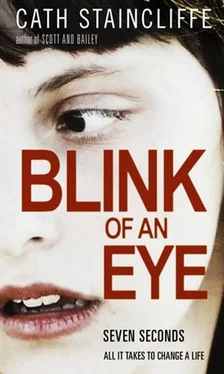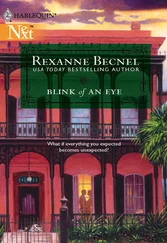She was dozing, her head down. I talked a little bit but she kept her eyes closed. I told her again about Ollie and her being a great-grandma. Knowing she retained no new information and had lost most of the old too.
A string of drool spooled from her chin to her arm. I took a tissue from the tray table in front of her and dabbed at her chin.
She woke, her eyes unfocused. Her hair was still done every three weeks, when a hairdresser visited, and she had a short grey bob, which suited her. The clothes hung off her now; she was steadily losing weight, indifferent to food and drink, on a special diet that included supplementary drinks expressly designed to help with that. There was one of the little bottles on the table. She could really have done with someone there to feed her more often, though I knew the staff did their best. I lifted the drink to her lips and tipped it, careful not to give her too much and risk her choking. She had two mouthfuls then stopped swallowing, letting the drink flow back down her jaw and on to her bib.
I’d brought a photograph of Ollie to give her, in a frame. Once I’d cleaned her up, I got it out and held it up for her. ‘This is Ollie, Mum, your great-grandson. Suzanne’s baby.’ I could have been showing her a tax return form for all the interest she showed. She only spoke once while I was there. ‘Hopeless,’ she said bitterly. One word. I’d no idea what was hopeless: me, her, the situation, the future?
I was thankful she hadn’t been nasty to me. ‘Go away, vulture,’ she used to say. ‘You make me sick. I hate you, pathetic, disgusting.’ She would pinch me, when she still had control of her movements, or stick her nails in my arm or my face, stabbing them like a fork. She was stronger then. Nowadays the drugs helped. A liquid cosh. I missed my mum. This was not her. This drooling harridan who looked at me with loathing when she looked at all. There was someone else under her skin, in her bones, in her gaze. And I wanted her dead.
I left the picture of Ollie in her room on my way out. Next to the photograph of Suzanne as a baby in my arms. Looking at that plunged me straight back there. Suzanne was born in St Mary’s Hospital one blustery March night. I still find it hard to describe those early days. The elation, the worry, the exhaustion, the piercing moments of joy and fear. My breasts hard as rocks and leaking milk, the awful backache the labour left me with, as though my pelvis had been dislocated. The tiny being we’d made, with her huge wise eyes, face crumpling in hunger, the fuzz on her head pale thistledown. Raging thirst and ravenous hunger and weeping at the beauty of the way the sun sliced through the trees. Times when I wanted it all to stop for a bit, so I could rest, retreat, worn down by the incessant calls on my energy. My fingers clumsy on the tiny buttons, eyes itchy with fatigue, resentment in my own throat as her cries grew louder. The overwhelming weight of the love I had.
Later, in my working life, at the times when I had to take the weighty decision to remove a child from a family, I knew that they had experienced all that. And I understood in my bones and my blood that there is no worse thing in the world than taking a child from its mother. Except leaving it to suffer in her care.
Taken a child, that was what Naomi had done. Not with legal documents and papers outlining risk assessments and medical reports. And not to give the child a better life, a safer world, a chance to heal. There was no greater good in Naomi’s story. No redemption. She had snatched the child, stolen her life, all the hope and love and promise, and condemned her parents to the hell of a future without her. To the purgatory of what might have been.
Naomi
‘You need a shower or a bath,’ Mum says.
I stink. It doesn’t bother me, but she’s not having it.
She gets one of her tablets from the cupboard, something to help with anxiety. She makes a point of taking it in front me. I think I’m meant to learn by example, ask to see the doctor.
‘I’ll run it for you, if you want a bath,’ she says. ‘There’s some smelly stuff left over from Christmas.’
‘Okay, thanks.’
In my mirror I can see the scars from the operations. A line red and knotted across my belly. I’m still supposed to do physio; the instruction sheets are in one of my drawers, I think. The place on my cheekbone where it was grazed has shiny thin skin; they don’t know if it will grow back properly. I may need a graft in future. I am marked. That seems fair, really. You hear about people walking away from a car crash without a scratch. But I’m well and truly scratched. Inside and out. I have no spleen. Before all this I’d no idea what a spleen did, where it was. Now I know it helps with cleaning the blood and is a major part of the immune system. They stuck me full of inoculations afterwards to stop me getting pneumonia or septicaemia or meningitis (I remember when Suzanne had meningitis, being scared she wouldn’t get better). I’ve been advised to get a flu jab each winter. Every day for the rest of my life I’ll take a low-dose antibiotic. We also have a stash of high-dose ones to be used at the first sign of fever.
The bathroom is full of steam and smells of mandarin oranges and pine leaves.
The water is milky and really hot. When I climb in, my skin prickles. I bend my knees and lie right back, my head resting on the lip of the tub.
The water covers my stomach and my breasts, slippery and so warm. I would like to melt away in it, to dissolve. To drain away down the plughole.
Sliding in further, I wet my hair and water fills my ears. There is shampoo on the side and conditioner. But this will do. I’ll be clean enough to satisfy Mum.
I think of Alex, wonder how he is, what he’s doing. Whether he’s met someone else yet. I haven’t touched myself, haven’t wanted to, since the accident. It’s like that part of me is dead. Another reason for breaking up with him. Like he’d want a frigid girlfriend.
There are drops on the tiles like tears, and mould along the edge of the bath, black spots on the sealant. My legs are hairy, something else I’ve neglected. My razor’s on the shelf.
I see blood in the bath, a soupy red, and me floating, lips blue, and Mum screaming. I scramble out of the bath quickly, water slopping over the side. My heart is bumping painfully in my chest, my head giddy. Frightened at the possibility. Frightened at the temptation. It would be so easy.
She calls up to me on her way out as I’m towelling dry: ‘See you later.’
She’s changed my sheets, opened the window. The air is quite cold in my room. There’s a vase of mini sunflowers on the desk. I start to cry. The yellow hurts my eyes. It will always feel like this, always.
I can’t bear it.
Carmel
There was knocking on the door, persistent, impatient.
When I answered it a lad was there, a teenager. He was casually dressed and wasn’t carrying a folder or a bag with goods for sale, or wearing any ID.
‘Is Naomi here?’ he said, and there was something in the quake of his voice and the brightness of his eyes that put me on alert.
‘No, she’s out,’ I lied.
‘Well, you tell her she’s a fucking bitch,’ he said, his face creasing and reddening, eyes blazing. ‘You fucking tell her. Right? You tell her!’
I stood my ground in spite of the rush of adrenalin that prickled my skin.
‘And who are you?’ I said as levelly as I could.
‘Robin Vasey.’
Lily’s brother. ‘Robin,’ I said. ‘I’m so sorry-’
‘Don’t fucking bother.’ He jabbed his finger my way. ‘It’s too late, it’s too late. That fucking bitch-’
‘Mum?’ Naomi called from the hall.
Читать дальше












